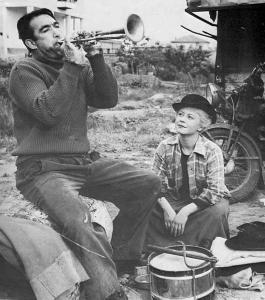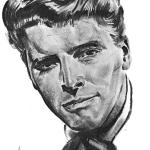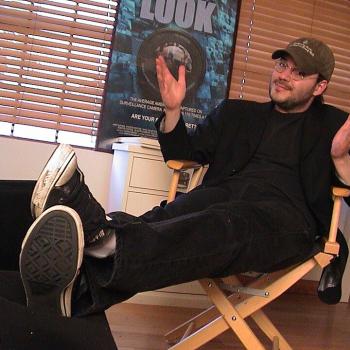
Source: Wikimedia user Bucherwiliam
License: Creative Commons
After absorbing Federico Fellini’s La Strada (1954) I didn’t say much for a few hours. I was tired and sweaty and had to run to catch a train; my wife was also tired, sweaty, and had to catch a train. But the exhausting rush home provided a fitting backdrop for the dark-matter pit brewing in my gut. Fellini’s film left me with what might otherwise seem opposite feelings: sympathy for the world and everyone in it and a sense of profound, unabating despair. My stomach acid broke against this paradox like waves on the White Cliffs of Dover. It’s eroding only slowly and seems as if it might outlast the rest of me.
La Strada is a movie about clowns, sideshows, and circuses that is in no way “fun.” We open on a beach as innocent, naïve Gelsomina (Giulietta Masina) collects reeds, her tranquil stroll interrupted by the half-excited, half-anguished shouts of children: “Rosa is dead!” Rosa is (or was) her sister who has been sold to a carnival strongman named Zampanò (Anthony Quinn). Their mother has sent Gelsomina’s little siblings to summon her because she will now sell Gelsomina too. Like some sort of Levitical marriage, one sister, who is just another mouth to feed in a fatherless family living in a shack by the shore, must replace another, one who perhaps substituted for another before that.
We close on the once-proud brute Zampanò, clutching handfuls of damp sand and hiding his face, weeping and wailing on the beach.
Zampanò does not pour out his anguish because he is a good man. He does the same dull trick, busting a chain across his chest, day in and day out. He spouts the same carnival soliloquy beforehand every time too, an old tune memorized down to the word, spewed before peasant crowds regardless of its effect. Zampanò eats ice cream cones in one gigantic chomp. He hits Gelsomina and grunts when she, herself driven more by intuition than contemplation, recommends he try thinking. His long gruff face always wears a scowl except when he’s drunk and flirting with buxom barflies. Still, we feel bad for him by the time he’s crying on that beach. We wish even a brute like him had a better place in the world.
Zampanò’s counterpart is Il Matto, the Fool (Richard Basehart), a cheeky acrobat and tightrope walker who openly mocks the cruel strongman. Il Matto teaches Gelsomina the trumpet and convinces her that she and her “husband” must stay together because they’re all they have, all they know. Everything and everyone has a purpose. His sarcasm does not end with Zampanò though. Even as she struggles with the difficulties of circus life on the road, he cannot help but call Gelsomina ugly, to tease her that she could run away with him, only to callously smirk that that is impossible. She belongs where she is. He marinates in the power implicit in his mockery.
The tragedy is that he is right, the wise fool, even in his impishness. She only has Zampanò and, though he insists he needs only himself, he needs her, both for companionship and to add flair to what is otherwise a boring display of his ability to breathe in a whole lot of hot air. They are bound together in material and psychological abjection. Should she return home to a mother who sold her? Should he somehow become something other than a two-bit side show performer with a motorcycle?
The magic here is that Fellini has captured real life in all its glorious and horrifying ambiguity. Zampanò is a villain, plain and simple. We don’t learn anything about his backstory. There’s no Psych 101 explanation for his scowling thoughtlessness. We see him express kindness in small ways, broken ones, acts that cannot even come close to making up for his rude anger and mean spirit. And yet by the end, we feel bad for him; we weep with him knowing that the rest of his life, if in an inarticulable way, will be filled with misery and shame.
There has been beauty (and even a few laughs) in this most tragic of relationships. Suffering, death, and despair have resulted from poverty, stupidity, and innocence. Still, Fellini testifies to beauty. Still, we recognize how complicated and wondrous these small, inconsequential lives have been—much like our own. We walk out of the theater to face a long walk home with nothing to do but think and bow our heads.













